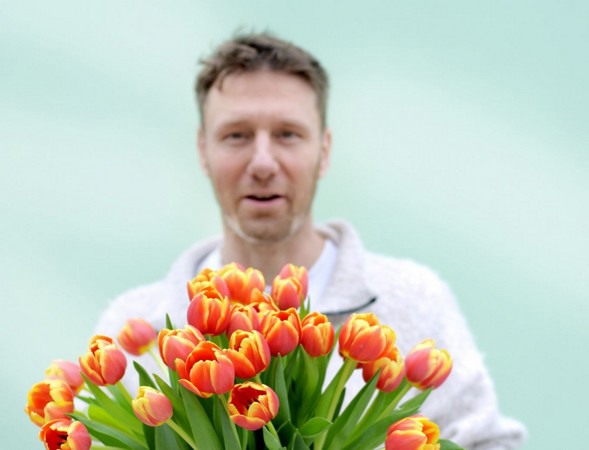Sam Ruijter grows tulips as “green” as possible. By taking a critical approach to the burden and impact on the environment, it has become abundantly clear to him where the production process – from bulb to tulip – can be improved. The good news is: ‘Working climate-neutrally doesn't require mega-investment.’
He is the first in the world to have carbon-neutral tulips. Sam Ruijter's nursery is continuously working on making the company even greener and using energy and raw materials as circularly as possible. And yet there is still plenty of greening to be done in the bulb to the tulip production process.
Tulpen van Sam is a flower bulb growing and forcing company located in Slootdorp (North Holland). Here, Sam Ruijter and his team grow tulips, which are spread over more than forty hectares of bulb fields and a greenhouse. Every year, he sells approximately 18 million tulips. His grandfather started the company in 1942, and since 2015 Ruijter Bloembollen has had the sub-brand Tulpen van Sam. ‘I want to set an example and inspire others to use energy and raw materials as circularly as possible. The result? The lowest possible carbon footprint. The fact that I am the first to have climate-neutral* tulips currently provides us with an advantage from a marketing point of view. Which is nice, but the real gains are for the climate.’

Market interest
Because of his concern for the planet, Sam has been measuring and reducing his carbon footprint for over five years. ‘I take the whole climate issue extremely seriously. In addition, I simply enjoy getting involved in this. Climate interests me, and I'm also a nature lover who is fascinated by technology.’ The fact that he regularly appears in the media with his sustainable story obviously ensures more attention for his tulips. ‘It has led to strong relationships with customers who also want to play their part. Because I am the first to grow climate-neutral* tulips, I get a lot of questions and reactions. Flower wholesalers are still exploring and their customers are very interested. My hope is that the trade will pick up on this and really start working differently and in a more environmentally friendly way.’
Carbon Footprint
Sam enjoys telling us how he first went about a more sustainable production. ‘You start by calculating your carbon footprint. An agency can do this for you and subsequently provide you with a recommendation. From there, you look at what you can do to reduce this footprint. But, usually, you already know what you need to focus on. For us, natural gas consumption, at about 80%, stood out the most, and we’ve now reduced its use by half. We have done so by installing a heat pump, which provides half of our heat requirement. We only turn boilers on during peak periods. At the same time, we would like to expand our heat pump capacity. This is on the cards for the future.’ What really shocked Sam was how energy-consuming watering the tulips in the field was. ‘Then again, the equipment required for this does run on diesel. Calculating your carbon footprint will leave you in no doubt as to what you need to focus on. At the moment, we’re in the process of developing something new for our sprinkler system.’
Compensation
Sam sees it as a fun challenge to continuously look at what he can do to reduce emissions. ‘If you take action right away, you will see emissions decrease from year to year.’ For his part, Sam can continue for at least a few more years to create fewer and fewer emissions. In the future, for example, his tractors will run on hydrogen. In Sam’s opinion, it simply is not possible to get your carbon footprint to 0, even if you stop using natural gas altogether, and with everything using renewable energy. ‘After all, you have to factor in commuting, fertilizer, and packaging... This is why you compensate. In theory, you can also be carbon neutral with fossil fuels, as long as you compensate enough. But we don’t intend doing this, of course.’
Their compensation is done by planting trees. Sam does this in association with the Black Jaguar Foundation. This Dutch organization is currently planting an enormous strip of trees in the Amazon region in Brazil, which will eventually become the longest nature corridor in the world. ‘If you go about it properly, you don't even have to compensate that much,’ says Sam. ‘I was already doing a lot by reducing chemicals. Trying to keep crops healthy naturally is the biggest challenge.’
Statutory requirements
Tulpen van Sam, of course, has the usual MPS A+ and GLOBALG.A.P. certifications. ‘Supermarkets were increasingly requiring us to have an environmental certificate, which is why we moved in that direction five years ago. Personally, I don't think it makes much difference to the planet. All growers having an environmental certificate will do little to change the environment. Keeping track of what you consume is just a legal requirement that you have to comply with anyway. The only advantage is that you have your affairs in order, and that you register everything you use and consume. And this is only the basis for being able to arrive at a reliable carbon footprint calculation. The calculation itself won’t make you more environmentally friendly, but it does raise awareness.’
Making a difference
His dream for the future is for the entire Dutch floriculture industry to become carbon neutral. ‘Look, a bouquet of flowers is obviously a luxury product. People buy them because they love nature; however, at the same time, the planet is deteriorating. I am part of that problem. I am acutely aware of that. But I am also part of the solution. After all, this problem won’t be going away anytime soon. However, everyone can make a difference in his or her own way; big or small, it doesn’t matter. I like inspiring people, and hope that, by sharing my story, others will also contribute in their own way to a better living environment.'
For more information: Royal FloraHolland
Royal FloraHolland
www.royalfloraholland.com
